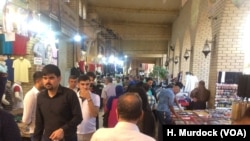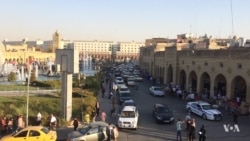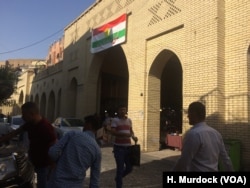ນາຍົກລັດຖະມົນຕີເທີກີ ທ່ານ Binaili Yildirim ໄດ້ເຕືອນໃນວັນສຸກວານນີ້ວ່າ ແຜນ
ການຂອງຊາວເຄີດໃນອີຣັກ ທີ່ຈະຈັດການລົງປະຊາມະຕິ ເພື່ອຄວາມເປັນເອກກະ
ລາດນັ້ນ ແມ່ນ “ຄວາມຜິດພາດ ຮ້າຍແຮງທີ່ສຸດ.” ປະທານາທິບໍດີເຂດKurdistan
ຂອງຊາວເຄີດ ໃນອີຣັກ ທ່ານ Masoud Barzani ໄດ້ຮຽກໃຫ້ມີການລົງປະຊາມະຕິ
ດັ່ງກ່າວໃນວັນທີ 25 ເດືອນກັນຍານີ້ ຢູ່ທີ່ເຂດເຄິ່ງປົກຄອງຕົນ.
ເທີກີ ຊຶ່ງມີຊາຍແດນຕິກກັບເຂດ Kurdistan ຂອງອີຣັກ ມີສຳພັນທີ່ເຂັ້ມແຂງກັບທ່ານ Barzani ແຕ່ວ່າ Ankara ໄດ້ເພີ້ມຄວາມກົດດັນ ຮຽກຮ້ອງໃຫ້ຍົກ ເລີກການລົງປະຊາ
ມະຕິດັ່ງກ່າວ. ຍັງອີກ 10 ມື້ເທົ່ານັ້ນກໍຈະມີການລົງປະຊາມະຕິແລ້ວ. ເພາະສະນັ້ນ
ຂ້າພະເຈົ້າຢາກເວົ້າຊໍ້າອີກ ໃນນາມເພື່ອນມິດ ຂອງທ່ານ Masoud Barzani ໃຫ້ແກ້
ໄຂຄວາມຜິດພາດດັ່ງກ່າວໃນຂະນະທີ່ຍັງມີເວລາເຫຼືອຢູ່.” ທ່ານ Yildirim ກ່າວໃນວັນ
ສຸກວານນີ້ຕໍ່ບັນດາຜູ້ສະໜັບສະໜູນ. ການເຕືອນໄດ້ມີຂຶ້ນຫລັງຈາກການຂົ່ມຂູ່ຂອງ
Ankara. ທ່ານ Yildirim ກ່າວ ເພີ້ມວ່າ “ພວກເຮົາບໍ່ຢາກທຳການລົງໂທດ ແຕ່ວ່າ ຖ້າ
ຫາກພວກເຮົາມາຮອດຈຸດນັ້ນ ມີຫລາຍຂັ້ນຕອນ ທີ່ໄດ້ວາງແຜນໄວ້ແລ້ວ ທີ່ເທີກີ
ຈະເຮັດ.”
ການເຕືອນມີຂື້ນຫຼາຍມື້ ຫລັງຈາກລັດຖະມົນຕີຕ່າງປະເທດເທີກີ ທ່ານ Mevlut
Cavusoglu ໄດ້ກ່າວຕໍ່ຊາວເຄີດວ່າ ເຂົາເຈົ້າຈະ “ມີບັນຫາກັບການລົງຄະແນນສຽງ.”
Ankara ພ້ອມດ້ວຍເຂດຂອງຊາວເຄີດກຸ່ມນ້ອຍທີ່ວຸ້ນວາຍ ທີ່ມີ ຊາຍແດນຕິດກັບເຂດ Kurdistan ໃນອີຣັກ ຢ້ານກົວວ່າ ປະເທດເອກກະລາດຂອງຊາວເຄີດ ອາດຊຸກຍູ້ໃຫ້ມີການຮຽກຮ້ອງແຍກດິນແດນ. ຄວາມຢ້ານກົວດັ່ງ ກ່າວໄດ້ມີເພີ້ມຂຶ້ນ ຍ້ອນສົງໄສວ່າ
ຊາວເຄີດໃນຊີເຣຍທີ່ຢູ່ທາງຊາຍແດນເທີກີມີ ຄວາມກະຕືລືລົ້ນຢາກເປັນເອກກະລາດ
ເຊັ່ນດຽວກັນ.
ເທີກີຢ້ານກົວວ່າ ການລົງປະຊາມະຕິຈະສ້າງບັນຫາດຽວກັນຢູ່ທົ່ວປະເທດ ກ່ຽວກັບການ
ແບ່ງແຍກທາງການເມືອງ ທີ່ເລິກແລບ. ທ່ານ Ceyda Karen ນັກຂ່າວຂອງຝ່າຍຄ້ານ
ເທີກີປະຈຳໜັງສືພິມ Cumhuriyal ກ່າວວ່າ “ການນຳເອົາແຜນການຢູ່ເຂດ Balkan
ມາໃຊ້ໃນຕາເວັນອອກາງ ຈະນຳໄປສູ່ຄວາມບໍ່ມີສະ ຖຽນລະພາບ.” ບັນດາຊາຍແດນບໍ່
ໄດ້ຂີດເສັ້ນແບ່ງປັນຢ່າງທ່ຽງທຳຢູ່ໃນຫລາຍໆພາກສ່ວນຂອງໂລກ. ຄຳຖາມກ່ຽວກັບວ່າ ຈະຊອກຫາຄວາມທ່ຽງທຳຢູ່ບ່ອນໃດ ເພື່ອແຕ້ມແຜນທີ່ຄືນໃໝ່ນັ້ນ ຍັງບໍ່ເປັນທີ່ຮູ້ໄດ້.”
ສະຫະລັດໄດ້ອອກສຽງຄັດຄ້ານຢ່າງແຮງຕໍ່ການລົງປະຊາມະຕິເພື່ອຄວາມເປັນເອກກະ
ລາດ. ໃນວັນສຸກວານນີ້ ທຳນຽບຂາວໄດ້ອອກຖະແຫລງການກ່າວວ່າ ສະຫະລັດ “ບໍ່ໃຫ້
ການສະໜັບສະໜູນ" ຕໍ່ແຜນການຂອງຊາວເຄີດທີ່ຈະຈັດການລົງປະຊາມະຕິ ໂດຍກ່າວ
ວ່າ ແຜນການນີ້ “ເປັນທີ່ລົບກວນຕໍ່ຄວາມພະຍາຍາມທີ່ຈະເອົາຊະນະກຸ່ມ ISIS ແລະ
ເຮັດໃຫ້ບັນດາເຂດປົດປ່ອຍ ມີຄວາມທຸ່ນທ່ຽງ.” ຍິ່ງໄປກວ່ານັ້ນຖະແຫຼງການຍັງກ່າວວ່າ
“ການລົງປະຊາມະຕິຢູ່ໃນເຂດທີ່ມີການຂັດແຍ້ງກັນ ໂດຍສະເພາະແລ້ວ ແມ່ນເປັນການ
ທ້າທາຍແລະກໍ່ໃຫ້ເກີດຄວາມ ບໍ່ທຸ່ນທ່ຽງ.”
ລັດຖະບານທ່ານທຣໍາ ຮຽກຮ້ອງໃຫ້ຊາວເຄີດຍົກເລີກການລົງປະຊາມະຕິ ແລະ ທຳການ
ພົວພັນ “ຢ່າງຈິງຈັງແລະເປີດການສົນທະນາແບບຍືນຍົງກັບແບັກແດດ" ແທນ ຊຶ່ງສະຫະ
ລັດໄດ້ສະເໜີຈະຊ່ວຍເປັນຜູ້ໄກ່ເກ່ຍ.
Turkish Prime Minister Binali Yildirim warned Friday that the Iraqi Kurdish plan to hold an independence referendum was a "grave mistake." Iraqi Kurdistan regional President Masoud Barzani has called for the referendum on September 25 in the semi-autonomous area.
Turkey, which borders the Iraqi Kurdish region, has strong ties with Barzani, but Ankara has been stepping up its pressure to call off the vote. "There are 10 days left ((to the referendum)). Therefore, I want to repeat our friendly call to Masoud Barzani: Correct this mistake while there is still time," Yildirim said Friday to supporters. The warning was followed by Ankara's first direct threat. "We don't want to impose sanctions, but, if we arrive at that point, there are steps that have been already planned that Turkey can take," Yildirim added.
The warning comes days after the Turkish foreign minister, Mevlut Cavusoglu, told the Kurds that they would "pay a price for the vote." Ankara, with its own restive Kurdish minority, that mainly borders Iraqi Kurdistan, fears an independent Kurdish state could fuel similar secessionist demands. Those fears are heightened by the suspicion that Syrian Kurds on the Turkish border harbor the same independence ambitions.
Turkish fears over the referendum have created rare common ground across the country's deep political divide. "Balkanization of the Middle East would bring instability," warned Ceyda Karan, a columnist with the Turkish opposition Cumhuriyet newspaper. "Borders are not drawn fairly in many parts of the world. The question of where to find fairness in redrawing them is unknown."
The United States has voiced strong opposition to the independence vote. On Friday the White House released a statement saying the United States "does not support" the Kurdish plan to hold a referendum, saying the plan "is distracting from efforts to defeat ISIS and stabilize the liberated areas." Further, it says, "Holding the referendum in disputed areas is particularly provocative and destabilizing."
The Trump administration is calling on the Kurds to cancel the referendum and instead engage in "serious and sustained dialogue with Baghdad," which the U.S. has offered to facilitate.
Iran has also registered its opposition to the referendum, but Turkey arguably has the most leverage on the Iraqi Kurds. The Habur border gate on Turkey's frontier with Iraq is the main trade route to the outside world for Iraqi Kurdistan, while an oil pipeline to the Turkish Mediterranean port of Ceyhan provides a financial lifeline.
Sanctions could prove to be a double edged sword. "Habur does not only mean gate to Iraqi Kurdistan," points out former senior Turkish diplomat Aydin Selcen, who set up Turkey's consulate in Iraqi Kurdistan's capital of Irbil. "Habur means gate to Iraq and in today's terms means gate to the Middle East as all border gates are closed with Syria. There is the oil pipeline; Iraqi Kurdistan oil, including Kirkuk oil, is being marketed to global markets through ((the port city of)) Ceyhan. That is a win, win for Ankara," Selcen added.
Financial considerations are not the only factors that Ankara has to consider. "Ankara is against it ((the referendum)) but on the other hand, Barzani is the best ally in the region. I think they are not that vocal when it comes to the referendum," says political scientist Cengiz Aktar. Barzani in the past decade has developed a close relationship with Ankara, one built not only on lucrative trade, but on security cooperation.
Barzani has provided assistance to Ankara in Turkey's war against the Kurdish rebel group the PKK, which is waging a decades-long insurgency for greater minority rights in Turkey and has bases in Iraqi Kurdistan.
Turkish election politics could further restrict Ankara's room to maneuver. The Iraqi Kurdish independence referendum threatens to complicate Turkish President Recep Tayyip Erdogan's re-election bid in 2019. "I understand Mr. Erdogan is trying to balance the traditional Kurdish vote that goes with ((Erdogan's)) AK Party and ((Turkish)) nationalists," points out former diplomat Selcen, who is now a regional analyst. The Kurdish vote in Turkey traditionally accounts for about 10 percent of Erdogan's support, votes that could be crucial in what is predicted to be a closely fought presidential election.
Analyst Selcen suggests the solution to the political conundrum posed by the Iraqi Kurdish independence vote to Erdogan's own ambitions could be to simply do nothing. "I think in today's system in Turkey, one should only follow closely what Mr Erdogan says, and, knowing his usual style and usual rhetoric, I find Mr. Erdogan's position much milder and more moderate. I will speculate that following September 25, the day of the referendum, it will be business as usual between Ankara and Irbil."








